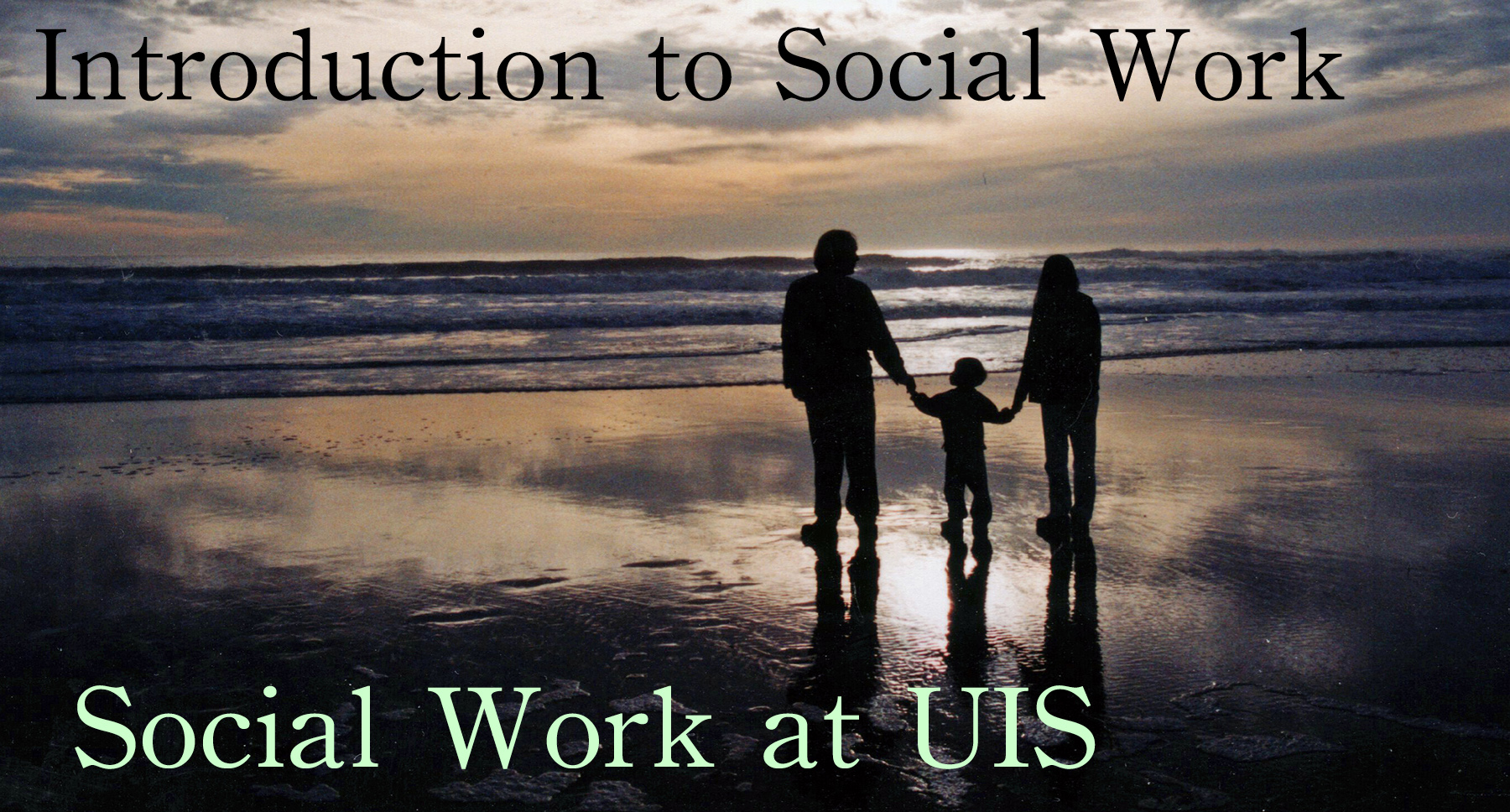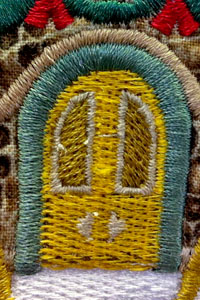This session begins with a class Zoom meeting on February 2nd.
Class session lasts from February 2nd at 2:00 p.m. to February 9 at 1:59 p.m. Discussion board continues to February 16.
This page describes what you should do in this third session.
The link for the Zoom meeting: https://uis.zoom.us/j/96733201869?pwd=M0VZMWxPMkhSRlJXQXBQK09kYmZzdz09
Meeting ID is 967 3320 1869 and the password is 322322
Objectives of this session
- Make sure that everyone understands what is going on in the Known to Social Services story.
- Consider how the social worker Diane Foster in Known to Social Services exhibits professional and ethical behavior.
- Consider how the social workers in Days in the Lives of Social Workers show through their attitudes and behaviors that they are professionals and follow ethical standards.
- Contemplate how social workers might supplement or replace police in some types of police work; which ideas are plausible and could be good ideas, and which seem more far-fetched.
- Consider the question of how much information is required to make important decisions. For example, what level of information does a social worker need in order to know how to proceed with some action? How much do we need to assess a situation before, for example, we remove a child from a home, or decide to not remove a child from a home?
- Consider the epistemology of social work. What is evidence-based practice, and how is social work scientific? How do we know that we know something?
Time Budget for 9 hours
2h 30m Reading and posting in Canvas discussion board and attending Zoom class meeting
3h 15m Reading chapters 21 through 32 and Epilogue (pages 181-294) in Known to Social Services.
4h Collect articles and sources to help you write your paper. Spend much of your time preparing to write your paper by clarifying what sort of a paper you want to write, and researching the topic.
15m Look at the NASW Code of Ethics (2017 version) and read the pre-amble. Choose one of the six core values embraced by social work and spend about 6-10 minutes free-writing about what that core-value means to you.
30m You could take the first test, and you should do so this week (but it is available until the end of the course, if you want to delay a bit).
What will happen in the class meeting at the start of this session?
During our 2.5 hours, I expect to use time in the following ways:
We will review Known to Social Services and examine the family dynamics and problems experienced by several of the clients Diane Foster helps. This can lead to a discussion of various topics related to child abuse and neglect, self-esteem, and tools used by social work when making assessments (genograms, ecomaps, person-in-environment charts, and assessments of strengths).
I will probably give a brief lecture on famous social workers. This will be an introduction to the history of social work.
Depending on what we covered in the second session of the course, I may want to review some of the main social problems social workers attempt to address, some of the most common psychological problems we see in our practice, and just give an overview of what we are up against. I may also need to discuss the difference between generalist social work practice (the typical model used in BSW programs) and specialized social work practice (e.g., mental health, children and families, social development and administration, health care practice, gerontological practice, forensic practice, and school social work).
- Note that I am giving you lots of time to work on your paper this week. Please do invest a few hours on researching your topic, so that you will not fall behind.
What must you read this week?
Reading chapters 21 through 32 and Epilogue (pages 181-294) in Known to Social Services.
Work on your paper.
Hopefully, you devoted a couple hours to your paper last week, thinking about what you would write, and gatherig and reading a few sources. This week, you should devote significant time (four hours, ideally) to finding and reading sources in your topic area.
Activities
Your activities this week are essentially: finishing Known to Social Services and researching your paper and participating in the discussion board. You may also take your first test, and there is a little exercise that becomes something you post on the discussion board as question 9.
Working on your Assignments
You have one special assignment this week (in addition to working on your paper)
- You should read the Preamble of the NASW Social Work Code of Ethics (see below). The entire code of ethics is available in Canvas. The Preamble lists six core values of social work. You should devote several minutes (6-10) to free-writing, off the top of your head, your conception and thoughts about any one of those six values.
- Work on your paper. You probably ought to put about four hours into gathering and reading sources.
- Spend about two hours and thirty minutes on the discussion board.
- Finish reading the book Known to Social Services.
- You should probably take the first test, which is available in Canvas. You may take it with open book and open notes, but you only have thirty minutes to complete the test.
Preamble of the NASW Code of Ethics
The primary mission of the social work profession is to enhance human well-being and help meet the basic human needs of all people, with particular attention to the needs and empowerment of people who are vulnerable, oppressed, and living in poverty. A historic and defining feature of social work is the profession's focus on individual well-being in a social context and the well-being of society. Fundamental to social work is attention to the environmental forces that create, contribute to, and address problems in living.
Social workers promote social justice and social change with and on behalf of clients. "Clients" is used inclusively to refer to individuals, families, groups, organizations, and communities. Social workers are sensitive to cultural and ethnic diversity and strive to end discrimination, oppression, poverty, and other forms of social injustice. These activities may be in the form of direct practice, community organizing, supervision, consultation, administration, advocacy, social and political action, policy development and implementation, education, and research and evaluation. Social workers seek to enhance the capacity of people to address their own needs. Social workers also seek to promote the responsiveness of organizations, communities, and other social institutions to individuals' needs and social problems.
The mission of the social work profession is rooted in a set of core values. These core values, embraced by social workers throughout the profession's history, are the foundation of social work's unique purpose and perspective:
- service
- social justice
- dignity and worth of the person
- importance of human relationships
- integrity
- competence.
This constellation of core values reflects what is unique to the social work profession. Core values, and the principles that flow from them, must be balanced within the context and complexity of the human experience.
Discussion Questions this week
Here are the discussion questions. You should have time to answer a few of them, and also respond to some of your classmates. Remember to devote at least an hour to the discussion board participation, even if you attended the Zoom class meeting.
- Discussion Question 3-1:
Check in and tell us how you are doing. What is going on in your life? What adventures have you had last week, and what are you looking forward to in the coming week? How is school going for you?
-
Discussion Question 3-2:
If you find any news articles about a social worker, or any social workers in the news, share your discovery here, hopefully with a link to the article or news item you found. What (if anything) does this tell us about social workers or the social work profession as it is presented in the media?
-
Discussion Question 3-3:
Many persons have physical, cognitive, and developmental challenges. These can be very mild, as with persons suffering from autism, but experiencing challenges that leave them on the high-functioning end of the autistic spectrum, or extremely severe, as with persons born with serious physical disabilities and profound cognitive disabilities. As we age, it's also expected that in the last years or months of our lives we may lose some of our physical and cognitive abilities due to dementia (e.g., multi-infarct / vascular dementias, Alzheimer's dementia, or Lewy Body disease) or other disabling diseases associated with aging. When we try to estimate how many persons have disabilities or "physical, cognitive, and developmental challenges" we are faced with the issue of drawing a line between persons who face challenges that warrant the use of a special category and persons facing extraordinary challenges that are not so severe that we could distinguish their situation from that of any other person facing the vicissitudes of life. A generally well-accepted estimate is that about 19% of Americans face "physical, cognitive, and developmental challenges". That works out to a number between 50 and 60 million Americans. Share your experience of having a special challenge, or of having a friend or family member who lives with physical, cognitive, or developmental challenges. What has been helpful to the person facing the special challenges? Have social workers been involved in helping ensure that special needs are being addressed?
- Discussion Question 3-4:
Certain conditions are frequent causes of developmental challenges. Among these are:
1) Autism
2) Cerebral palsy
3) Down syndrome (Trisomy 21)
4) Epilepsy
5) Fetal alcohol syndrome
6) Fragile X syndrome
7) Hearing and vision problems
8) Duchenne Muscular Dystrophy and other skeletal-muscular degenerative diseases
9) Traumatic brain injury
10) Birth defects and various orthopedic problems
With which of these are you most familiar through the experiences you have seen among members of your family or friends? In those situations with which you are familiar, are you aware of any steps that were taken to help persons facing challenges associated with those conditions? In what ways were people making efforts to support the ideals of inclusion, creating a supportive environment, and fighting to remove stigma?
-
Discussion Question 5:
At the start of the third class session you have read about 2/3rds of Known to Social Services, but by the end of this session and our 4th class session meeting you will have finished the book. As you work your way through the end of the book, reflect on two aspects of Diane Foster's successes and failures. What qualities does Diane exhibit that help her succeed in her efforts to protect children and help her clients have better lives? Which of her qualities lead to undesirable results? Using Diane as an example case, what conclusions do you draw about the qualities that we should hope to cultivate in ourselves if we want to be successful social workers, and what are some of the traits we need to guard against?
-
Discussion Question 3-6:
In Known to Social Services we can see the universal problem of imperfect knowledge. One task of a social worker is to gain an understanding of a situation. We do this through things like assessment, diagnosis, interviewing, and researching a problem. A universal problem in human knowledge-building is that all sources are fallible. In social work it seems this problem is especially severe, as our sources are especially unreliable. We often must seek information from persons who have good reasons for lying to us, have a history of being deceitful, and who may actively be attempting to mislead us. We are often investigating behaviors that are extremely private and secretive. Whether you investigate allegations of child maltreatment, try to understand what might be causing undesirable actions in an adolescent trying to adjust to new life circumstances, or try to assess the needs of someone seeking benefits your agency is distributing, you often must evaluate the accuracy of reports you receive from informants who may themselves have poor insight into what is going on in their lives. In Known to Social Services describe a situation where the social worker Diane Foster has limited information and must try to either gain additional information or else make decisions based on theories about cases she has developed with limited information. That is, where does she make a decision based on some hunch or assumption or some idea of what is going on in a case when her information about the case is not very substantial? Or, where does she realize her information is so insubstantial that she must gather more information before making a decision about what to do? Discuss this issue of how professional social workers make decisions about getting more information or acting on ideas about reality that are based on sparse information.
-
Discussion Question 3-7:
In last week (week 2) you read the account of being an emergency room social worker written by Ogden W. Rogers. Rogers had to deal with the death of an older gentleman, and a child, and he also had to talk with an evasive young man who had stolen a car. As you consider what Rogers did in these cases, consider the core values or core mission that directed the way he behaved. What are the professional standards or ethical principles that seem to shape the way Rogers treats clients? Are there any specific things he does that show a specialized expertise or professional role?
-
Discussion Question 3-8:
In last week (week 2) you read the account of being a social worker in a Texas police department written by Claire McCullough Godfrey. She did crisis counseling and, most memorably, had to inform Elizabeth’s father about her death from an overdose. While that chapter gave you an insight into how social workers might work with police, you might have noticed suggestions (often frequent in 2020) that police departments get some money transferred to social workers, who could care for cases where violence was unlikely, such as wellness checks. Having read the chapter by the police social worker, what are some of your thoughts on whether or how social workers might do more police work, doing more than mainly victim services and crisis counseling?
-
Discussion Question 3-9:
Share your free-writing exercise in which you write about what any one of the six core values of social work means to you. This is a personal 6-to-10-minute essay you should write from your heart without worrying about style or grammar. Just jot down your thoughts or feelings about any one of the six core values, and share your exercise results in this thread.



















